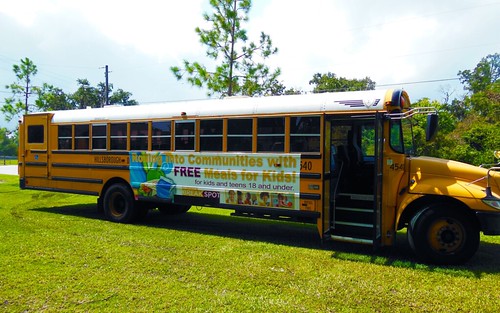
With summer approaching, many of our nation’s students will soon be out of school enjoying their break. However, too many of these children may miss out on a meal they normally would receive through USDA’s school meals programs. Thanks to an innovative approach, Florida’s at-risk children can now have meals brought to them through the Summer Food Service Program, by way of a very creative partnership.
Florida’s Mobile Summer BreakSpot Program (a collaboration of the Florida Department of Agriculture and Consumer Services and the childhood hunger group Florida Impact) has developed a way to renovate school buses to transport summer meals to neighborhood children in need.
Debra Susie, President/CEO of Florida Impact, cited the results of the collaboration, “one of the most innovative in the country for aggressively ensuring at-risk children have nutritional access over the summer, and our network of community leaders are demonstrating yet another opportunity for getting meals to where the children are.”
Orange County Public Schools’ mobile fleet includes a renovated school bus, food truck, catering van and two hot and cold trucks to serve students and their communities. The five mobile units together visited over 10 sites per day, making stops to mostly parks and recreation centers. Each day, the food truck/bus route served approximately 100 children for breakfast and 200-300 for lunch during the summer of 2013.
Pasco County Public Schools’ mobile unit program began in 2010 and last summer served communities in Holiday Hudson, and Dade City, including migrant social service agencies and affordable housing units. To increase participation at bus stops, Pasco County is designing activities to encourage children to stay on the buses to eat the meals. The School District served 4,249 lunches in 2013.
Hillsborough County Public Schools runs three mobile units, all serving breakfast and lunch. Each unit has two to three stops, including those at local housing authority residential centers. Hillsborough County is exploring new ways to motivate children to stay on the bus and finish their meals and to increase attendance at their sites. Last year, they served 5,842 breakfasts and 9,538 lunches!
Thanks to this impressive strategy, summertime won’t be a hungry time for Florida’s children.
